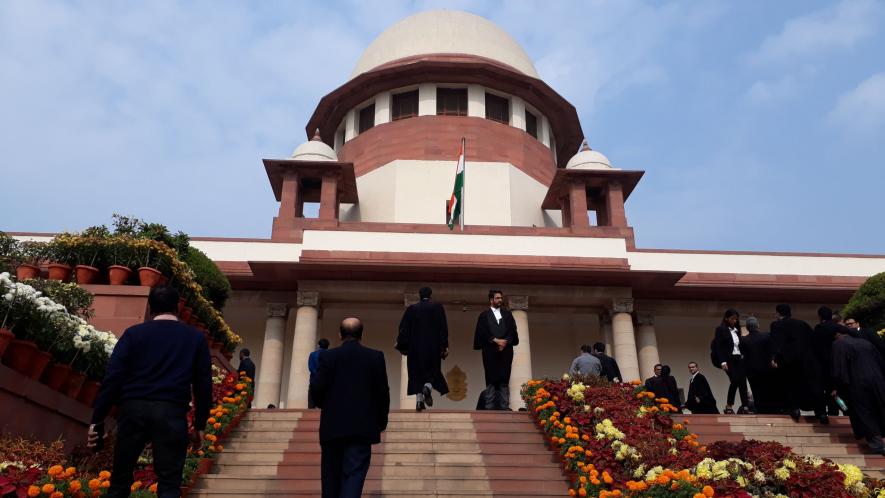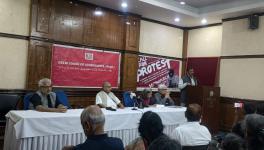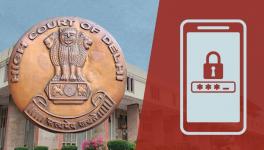SC Orders Circulation of Guidelines on Seizure of Digital Devices

Image Courtesy: Wikimedia Commons
The Supreme Court (SC) has directed senior advocate Nitya Ramakrishnan to circulate guidelines to the Centre and the states for seizing personal electronic devices, like laptops and cell phones, by investigating agencies after five academicians prepared a set of draft guidelines and submitted it to the apex court in the PIL Ram Ramaswamy and Ors. v. Union of India and Ors.
On October 3, the Delhi Police’s Special Cell raided the office of NewsClick and the houses of its journalists, employees, consultants and contributors in Delhi-NCR and seized their laptops and mobile phones on allegations that the news portal had received funding from China.
A Bench of Justices Sanjay Kishan Kaul and Sudhanshu Dhulia directed Ramakrishnan to circulate these guidelines on Thursday after considering the PIL, LiveLaw reported.
According to the draft guidelines, filed through advocate S Prasanna, electronic devices can be seized only after a judicial warrant.
Though emergency seizure must be an exception, reasons for not obtaining a judicial warrant must be recorded. However, in either case, it must be “expressly” mentioned why and in what capacity the device is required to be seized.
Electronic items shouldn’t be seized on the ground that evidence may be found. “In other words, seizure on the conjecture that evidence may be found will not be permissible in any circumstance especially where the device does not belong to an accused person,” as the draft guidelines.
Privileged, professional, journalistic or academic materials can’t be seized without a judicial warrant and only if the material is directly linked with the crime.
“If the intention is to search such privileged, professional, journalistic or academic material, then it must only be by a judicial warrant and upon the ground that the said material is directly part of the crime under investigation and not merely evidence of the same.”
NO RETENTION OF PERSONAL OR PRIVILEGED MATERIAL IN DEVICES
The seized device shall be produced before an independent agency and all irrelevant, personal and privileged material shall be identified.
The device shall be returned immediately after separating relevant material and a copy taken.
Besides, excluded material must not be retained.
“At initial examination by an independent agency, in the presence of the owner of the device (or their agent), all irrelevant, personal and privileged material is separately identified, the material relevant to investigation is demarcated and only a copy of such relevant material is taken,” the draft guidelines read.
“The irrelevant, privileged or personal material so excluded must not be retained, and the device itself should be returned immediately after taking a copy of only the relevant material for the investigation or suspect material.”
OWNER CAN’T BE COMPELLED TO REVEAL PASSWORDS
Unless bound under statutory provisions like Section 69 of the Information Technology Act, 2000, owners of electronic devices cannot be compelled to give away their passwords.
“The person whose electronic devices are sought to be searched/seized shall not be compelled to divulge any credentials or passwords or information, including any cloud-stored information except as statutorily prescribed for e.g. Section 69 of the Information Technology Act, 2000 if and when applicable.”
Besides, the laws enabling information from service providers/intermediaries may apply in the circumstances warranted in those laws.
The draft guidelines also specified that “no person shall be summoned by the police to produce their electronic devices whether as witnesses or accused”.
The investigating officer is bound to “ensure the extraction of relevant information and timely return to the owner or handing over safe custody to a court or other authority (where the owner cannot be found) to ensure copies are not accessed by any unauthorised person”.
If the precautions aren’t followed regarding such material, the same will not be used against the accused.
“Where these basic precautions have not been maintained, such material will not be used in any court or against any person accused of an offence or in any manner whatsoever,” the draft guidelines read.
VERY, VERY DANGEROUS’
Hearing another PIL filed by the Foundation for Media Professionals (FMP) demanding regulation of the police’s power to search or seize devices on Tuesday, the SC observed: “It is dangerous all powers are with the agencies ... it is very, very dangerous.”
The Bench told additional solicitor general SV Raju, appearing for the Centre, said that the issue is “serious” because media professionals will have the details of their sources in their devices, Hindustan Times reported.
Besides, there is concern for privacy, which is now acknowledged as a fundamental right, the court observed and called for guidelines. “There must be some guidelines. It is a matter of privacy.”
The SC said: “You must have some guidelines. You want us to do it. We will do it. But my view is that you ought to do it yourself. It can’t be a State that’s run through its agencies. You must analyse what kind of guidelines are necessary to protect (people) ... This is not adversarial.”
“There has to be a balancing of interests, and proper guidelines need to be in place to protect media professionals. We would like the ASG to work on this and come back on this issue. This is also in view of the aspect that privacy has itself been recognised as a fundamental right.”
Senior counsel Siddharth Aggarwal, representing FMP, raised concerns that private data from a person’s device can be misused by the State and that many state governments have resorted to such abuses. Besides, digital device could have biometric details prone to be severely misused against the owner.
When Raju said that investigating agencies cannot be shut out completely and devices need to be scanned to identify what is required for an investigation, the Bench retorted: “One dispensation teaches to another”, and asked him to consider introducing some guidelines.
The FMP PIL will be heard next on December 6.
In October 2022, FMP approached the apex court pleading that electronic devices contain more sensitive personal data about individuals than any physical space.
In the PIL, advocate Rahul Narayan claimed that current laws extend only to ‘documents’ or ‘things’ or ‘places’ excluding electronic records.
“Even if it is assumed that the existing legal provisions across general and special laws are applicable in context of the digital realm, going beyond mere production/seizure of devices but to the production/searches of their contents, it is submitted that existing legal provisions, either under the Criminal Procedure Code 1973 or under various special laws, are insufficiently tailored to ensure that law enforcement agencies exercise powers in a manner consistent with the fundamental right to privacy,” the PIL said.
These practices are contrary to the fundamental right to privacy inherent in Article 21 of the Constitution, it added.
The FMP urged that the contents of an arrested/accused person’s digital devices and password/passcode/biometric ID should be protected by the guarantee against compelled self-incrimination as under Article 20(3) of the Constitution.
Get the latest reports & analysis with people's perspective on Protests, movements & deep analytical videos, discussions of the current affairs in your Telegram app. Subscribe to NewsClick's Telegram channel & get Real-Time updates on stories, as they get published on our website.
























